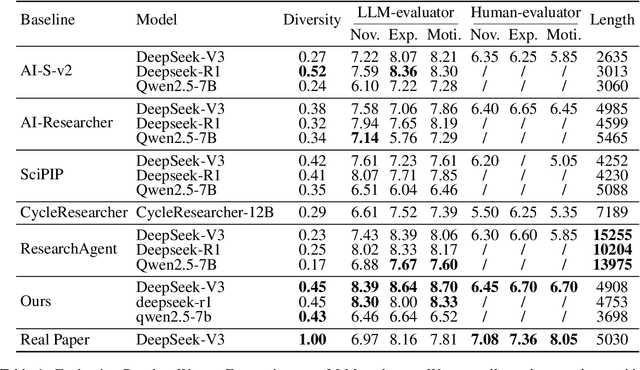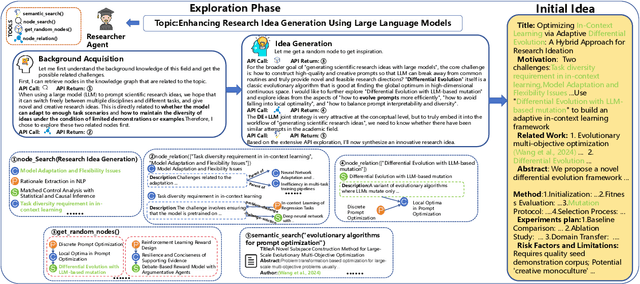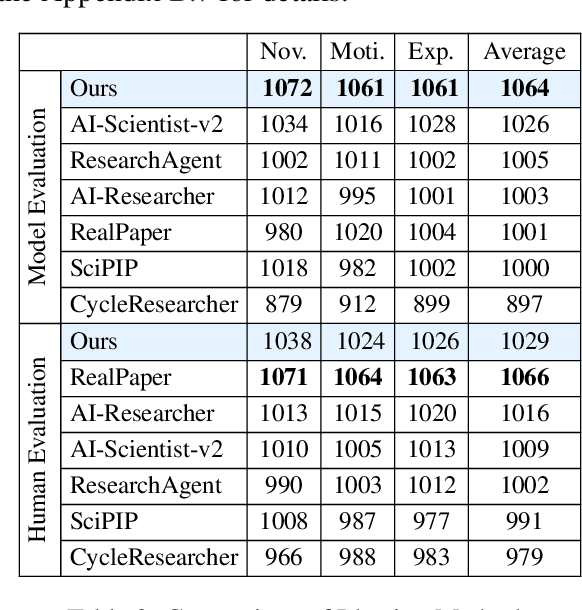Xinping Lei
Vibe AIGC: A New Paradigm for Content Generation via Agentic Orchestration
Feb 05, 2026Abstract:For the past decade, the trajectory of generative artificial intelligence (AI) has been dominated by a model-centric paradigm driven by scaling laws. Despite significant leaps in visual fidelity, this approach has encountered a ``usability ceiling'' manifested as the Intent-Execution Gap (i.e., the fundamental disparity between a creator's high-level intent and the stochastic, black-box nature of current single-shot models). In this paper, inspired by the Vibe Coding, we introduce the \textbf{Vibe AIGC}, a new paradigm for content generation via agentic orchestration, which represents the autonomous synthesis of hierarchical multi-agent workflows. Under this paradigm, the user's role transcends traditional prompt engineering, evolving into a Commander who provides a Vibe, a high-level representation encompassing aesthetic preferences, functional logic, and etc. A centralized Meta-Planner then functions as a system architect, deconstructing this ``Vibe'' into executable, verifiable, and adaptive agentic pipelines. By transitioning from stochastic inference to logical orchestration, Vibe AIGC bridges the gap between human imagination and machine execution. We contend that this shift will redefine the human-AI collaborative economy, transforming AI from a fragile inference engine into a robust system-level engineering partner that democratizes the creation of complex, long-horizon digital assets.
AutoMV: An Automatic Multi-Agent System for Music Video Generation
Dec 13, 2025Abstract:Music-to-Video (M2V) generation for full-length songs faces significant challenges. Existing methods produce short, disjointed clips, failing to align visuals with musical structure, beats, or lyrics, and lack temporal consistency. We propose AutoMV, a multi-agent system that generates full music videos (MVs) directly from a song. AutoMV first applies music processing tools to extract musical attributes, such as structure, vocal tracks, and time-aligned lyrics, and constructs these features as contextual inputs for following agents. The screenwriter Agent and director Agent then use this information to design short script, define character profiles in a shared external bank, and specify camera instructions. Subsequently, these agents call the image generator for keyframes and different video generators for "story" or "singer" scenes. A Verifier Agent evaluates their output, enabling multi-agent collaboration to produce a coherent longform MV. To evaluate M2V generation, we further propose a benchmark with four high-level categories (Music Content, Technical, Post-production, Art) and twelve ine-grained criteria. This benchmark was applied to compare commercial products, AutoMV, and human-directed MVs with expert human raters: AutoMV outperforms current baselines significantly across all four categories, narrowing the gap to professional MVs. Finally, we investigate using large multimodal models as automatic MV judges; while promising, they still lag behind human expert, highlighting room for future work.
SWE-Compass: Towards Unified Evaluation of Agentic Coding Abilities for Large Language Models
Nov 07, 2025Abstract:Evaluating large language models (LLMs) for software engineering has been limited by narrow task coverage, language bias, and insufficient alignment with real-world developer workflows. Existing benchmarks often focus on algorithmic problems or Python-centric bug fixing, leaving critical dimensions of software engineering underexplored. To address these gaps, we introduce SWE-Compass1, a comprehensive benchmark that unifies heterogeneous code-related evaluations into a structured and production-aligned framework. SWE-Compass spans 8 task types, 8 programming scenarios, and 10 programming languages, with 2000 high-quality instances curated from authentic GitHub pull requests and refined through systematic filtering and validation. We benchmark ten state-of-the-art LLMs under two agentic frameworks, SWE-Agent and Claude Code, revealing a clear hierarchy of difficulty across task types, languages, and scenarios. Moreover, by aligning evaluation with real-world developer practices, SWE-Compass provides a rigorous and reproducible foundation for diagnosing and advancing agentic coding capabilities in large language models.
MotivGraph-SoIQ: Integrating Motivational Knowledge Graphs and Socratic Dialogue for Enhanced LLM Ideation
Sep 26, 2025



Abstract:Large Language Models (LLMs) hold substantial potential for accelerating academic ideation but face critical challenges in grounding ideas and mitigating confirmation bias for further refinement. We propose integrating motivational knowledge graphs and socratic dialogue to address these limitations in enhanced LLM ideation (MotivGraph-SoIQ). This novel framework provides essential grounding and practical idea improvement steps for LLM ideation by integrating a Motivational Knowledge Graph (MotivGraph) with a Q-Driven Socratic Ideator. The MotivGraph structurally stores three key node types(problem, challenge and solution) to offer motivation grounding for the LLM ideation process. The Ideator is a dual-agent system utilizing Socratic questioning, which facilitates a rigorous refinement process that mitigates confirmation bias and improves idea quality across novelty, experimental rigor, and motivational rationality dimensions. On the ICLR25 paper topics dataset, MotivGraph-SoIQ exhibits clear advantages over existing state-of-the-art approaches across LLM-based scoring, ELO ranking, and human evaluation metrics.
Inverse IFEval: Can LLMs Unlearn Stubborn Training Conventions to Follow Real Instructions?
Sep 04, 2025Abstract:Large Language Models (LLMs) achieve strong performance on diverse tasks but often exhibit cognitive inertia, struggling to follow instructions that conflict with the standardized patterns learned during supervised fine-tuning (SFT). To evaluate this limitation, we propose Inverse IFEval, a benchmark that measures models Counter-intuitive Abilitytheir capacity to override training-induced biases and comply with adversarial instructions. Inverse IFEval introduces eight types of such challenges, including Question Correction, Intentional Textual Flaws, Code without Comments, and Counterfactual Answering. Using a human-in-the-loop pipeline, we construct a dataset of 1012 high-quality Chinese and English questions across 23 domains, evaluated under an optimized LLM-as-a-Judge framework. Experiments on existing leading LLMs demonstrate the necessity of our proposed Inverse IFEval benchmark. Our findings emphasize that future alignment efforts should not only pursue fluency and factual correctness but also account for adaptability under unconventional contexts. We hope that Inverse IFEval serves as both a diagnostic tool and a foundation for developing methods that mitigate cognitive inertia, reduce overfitting to narrow patterns, and ultimately enhance the instruction-following reliability of LLMs in diverse and unpredictable real-world scenarios.
 Add to Chrome
Add to Chrome Add to Firefox
Add to Firefox Add to Edge
Add to Edge